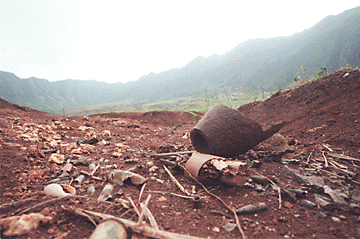


Waianae residents worried
By Suzanne Tswei
about contamination
Star-BulletinA representative of the U.S. Environmental Protection Agency said he will recommend further environmental tests on the effects of the Army's use of Makua Military Reservation as a weaponry and chemical disposal site.
In the meantime, a group of Waianae Coast community leaders said it will look for an impartial evaluation of earlier environmental tests that they believe are inadequate in addressing questions about the spread of contamination.
After hearing community leaders' concerns about possible contamination of two brackish water ponds, or across the military reservation, Carl Warren, EPA environmental scientist, said he would recommend tests of the ponds to see if there is any contaminated runoff from the military reservation.
About a dozen community leaders and activists met with Warren and Army officials yesterday and showed them the ponds where children often play and fish. The group said the ponds may be contaminated with arsenic, lead and explosive residues carried by runoff during heavy rain.
"I don't let my son play here anymore, not until I find out for sure what is happening," said community activist William Aila.
Aila, who took a day off from his job as manager of the Waianae Boat Harbor, said he believes that environmental tests conducted in 1993 were not thorough enough to ensure that contamination has not occurred outside of the military reservation.
"They only took soil samples six inches deep. That's not enough," Aila said, pointing to the dry bed of Makua Stream.
"When there is heavy rain, the water would wash out all six inches, or more, off the top. There would be nothing left (of the contamination) to test," Aila said.
Community leaders said they are worried particularly about runoffs from a four-acre area known as the open-burn, open detonation site on the reservation. The Army had used the site as a waste disposal, including possibly mustard gas and napalm, they said.
Army officials said they do not have complete records of the wastes that were disposed at the site, although they had no records of anything other than weaponry and hospital chemicals.
"How come you don't know the stuff, but you are telling us not to worry about it?" asked Cynthia Rezentes, chairwoman of the Waianae Neighborhood Board.
The 1993 tests included soil samples of the site as well as sediment and water samples at the edge of the reservation. Warren said the disposal site showed elevated contamination levels of lead, arsenic and explosive residues, but that it did not pose a risk to the public. Samples taken at the border indicated there was no contamination outside the reservation.
But community leaders said heavy rain may have carried the contamination from the disposal down nearby Makua Stream and into the ponds and ocean.
"We fish out there. We dive, we collect herbs down there. We want to know (if there is contamination outside of the reservation)," said Vince Dodge, a member of Malama Makua, a group seeking the return of the military reservation to civilian concern.